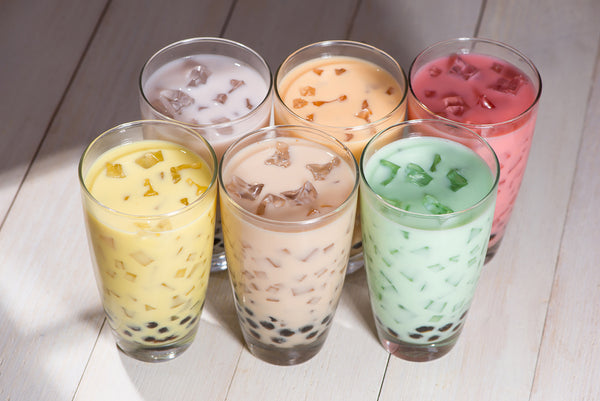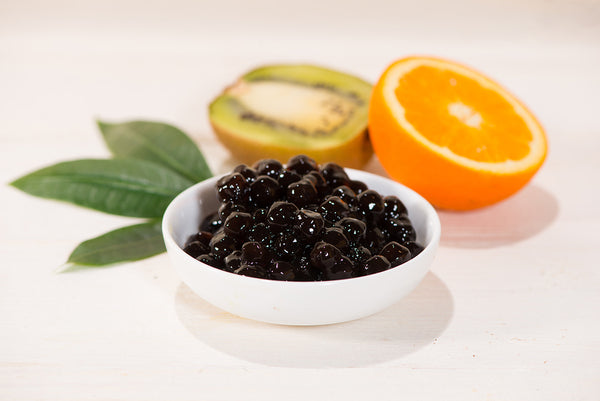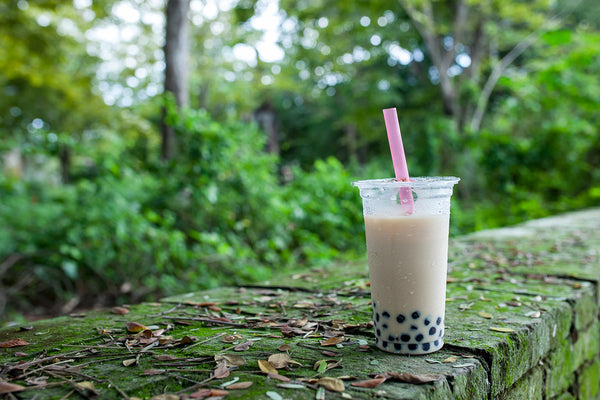Bubble tea, also called Boba tea, is one of the most popular drinks to come out of Taiwan in the last few decades. Naturally, that has left plenty of people wondering if vegan Boba is available.
The answer is complicated. It is very easy to make bubble tea without including anything that comes from an animal, and doing so if often cheaper than using animal products. That's more than enough to make sure that vegan options are available.
However, there are also recipes that do use animal products, and manufacturers don't always bother with clear labeling. If you want to be confident that you can drink your bubble tea, you're going to have to learn a little bit about the ingredients and either check labels thoroughly or produce your own.
What Is Bubble Tea?
Bubble tea is a recent invention with a fairly short history. The drink only dates back to 1983, when street vendor in Taiwan named Liu Han-Chieh added tapioca pearls to chilled and flavored tea.
Since the tea had to be shaken to mix the flavorings properly, it was filled with bubbles. The tapioca pearls also resembled bubbles, and those two features gave the drink its name. New version of the drink began to appear as it became more popular, and it soon spread all over the world.
There are a lot of different types of Boba out there, but they all have a few things in common. The tapioca pearls are the most distinctive feature, and they can be found in every type.
Most of them also include some sort of sweetener, which is most often honey. Most varieties will also include either milk or fruit, or occasionally both. Finally, all of those components will be mixed into tea. Any type of tea can be used, and the variety will have a huge impact on the flavor of the drink.

Common Ingredients of Bubble Tea
- Tea
- Tapioca Pearls
- Sweetener
- Milk
- Fruit (Sometimes)
Is Bubble Tea Vegan?
That ingredient list may make it look like it is impossible to get a vegan boba drink, but substitutions make it very possible. There are plenty of people that have found ways to do it, and they usually make much better drinks than non-vegan providers.
The vegan forms also tend to be much cheaper, so they can be a good tool for encouraging non-vegan friends to cut some animal products out of their diets. Fortunately, there are only a few ingredients that might be a cause for concern, so it's fairly easy to check a recipe to see if there are any animal products in it.
Tapioca Pearls
The tapioca pearls, sometimes called tapioca balls, are generally rare outside of a few Eastern cuisines. That means that many people are unfamiliar with them, and worry that they might not be vegan. That's a reasonable concern, but vegans rarely need to worry about them.
A tapioca ball is just a sphere of starch that comes from the cassava root. That having been said, many manufacturers add in sweeteners or flavorings, and there's no guarantee that those additives are vegan. The most common addition is sugar, which is normally safe, but there are exceptions.
When in doubt, opt for white tapioca pearls instead of dark ones. The pearls are white in their natural state, so a white pearl is a sign that nothing has been added to it. If you want to be especially safe, you can always make your own tapioca pearls without too much work.
Sweeteners
Sweeteners are one of the big problems areas for bubble tea. The single most common choice is honey, which is not vegan. Some tea shops will only offer honey, but many of them will offer vegan substitutes, such as agave, by request.
If there are no special requests, they usually err on the side of honey, so vegan need to be sure to ask every time. Some shops will also offer a list of sweetener options. In most cases, some of them will be vegan and some of them will not.
Be sure to look up a list of vegan sweeteners before visiting any tea shop to make sure that you know which ones are safe and which are not. When making bubble tea at home, simply choose whichever vegan sweetener you would use for ordinary tea.
Almost all of them will work, but they will taste slightly different from each other, so it's reasonable to experiment to find the one that best suits your tastes.
Milk and Substitutes
Dairy additives are the other major concern for vegans. Condensed milk is an extremely common ingredient bubble tea, but some recipes will also call for creamers or fresh milk.
None of those ingredients are vegan, but there are plenty of popular substitutes. Soy milk is the most common, but any of the usual dairy alternatives will work. These substitutes are much more common in tea shops than the vegan sweeteners, so finding one will rarely be a problem as long as you remember to ask for it when you place your order.
How to Make Vegan Bubble Tea
The only way to be positive that your bubble tea is vegan is to make your own. Fortunately, it's not a terribly difficult process. It does take a little bit of planning, but that's a small price to pay to be sure that your tea is cruelty-free.
This recipe makes enough tea for two people, so you can easily share it with a friend. If you do, consider serving it without letting anyone know that the drink is vegan. After they've tried it, go up to the ones who enjoyed it, and ask "Is boba tea vegan, or not?"
They will probably realize that they've been drinking vegan tea, and they will probably be open to doing it again. If that is the case, print out a copy of the recipe so that they can make it own their own. This won't be enough to make them swear off animal products altogether, but cutting out animal products for even a small part of the day can lead to big effects, especially if a lot of people do it. Every little bit helps.

The Ingredients
- 30g Black Tapioca Pearls
- 10g Black Tea Leaves
- 300g Water
- 300g Soy Milk
- 30-60g Maple Syrup, to taste
The Process
- Start by soaking the tapioca pearls in water overnight. They will expand, so be sure to leave some empty space in the cup to make sure it doesn't overflow.
- Boil the tea leaves in the water for 1 or 2 minutes. A longer boiling time will make stronger tea.
- Add the soy milk to the tea, then leave it on the heat until it starts to boil again.
- Turn off the heat so that the tea mixture can cool.
- Boil the tapioca pearls in fresh water for 1 to 2 minutes.
- Strain the tapioca pearls, let them cool, and then add them to the tea.
- Add the maple syrup and serve.
The Verdict on Bubble Tea
Is bubble tea vegan? It certainly can be, but that isn't always the case. As with most foods and beverage, it depends on the manufacturer. If you're going to buy bubble tea, be sure to check the ingredient list carefully to identify any potential animal-derived ingredients.
Finding the right brands in a store or preparing your own vegan boba can take a little bit of effort, but most boba drinkers agree that the taste is more than enough to justify the work. If you want to help out your fellow vegans, be sure to post your findings in the comment section below to make it easier for them find acceptable products.



Leave a comment: